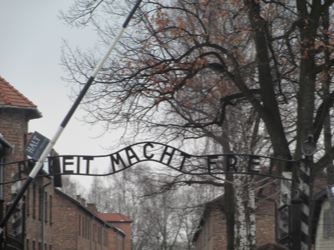The bus stops, our heads glued to the windows to see what awaits us at our first destination. We see snowflakes starting to fall from the clear sky. Immediately the concerns heighten. “I don’t have snow boots on!” “I don’t even have socks on!” “My coat is in my suitcase!” “I’m going to freeze!” We step off the bus and the cold air slaps us in the face. We are definitely not prepared for this.
We walk down the path, following our group’s tour guide. I can barely hear him over the sounds of our feet crunching the snow and gravel and the chatter that surrounds me. I stuff my hands in my pockets as far as they will go, searching for warmth. My whole body starts to shake and the feeling in my toes has disappeared completely. Our tour guide stops us and I look up to see his solemn face waiting for our attention. “Welcome to Treblinka.”
 Now the air feels cold and empty. No one speaks except for our tour guide and the wind. I am both afraid and curious of what is to come as my feet carry my numb body further and further past the snow-covered station where freight cars supposedly delivered their next victims. These victims were people, like you and me, who had families, friends, jobs, hobbies, emotions, hopes, dreams, and lives. I remember the tour guide telling us how these people were sometimes dropped off and immediately told to run as fast as they could while Nazis released dogs that chased them up to the gas chambers where they were gassed to death.
Now the air feels cold and empty. No one speaks except for our tour guide and the wind. I am both afraid and curious of what is to come as my feet carry my numb body further and further past the snow-covered station where freight cars supposedly delivered their next victims. These victims were people, like you and me, who had families, friends, jobs, hobbies, emotions, hopes, dreams, and lives. I remember the tour guide telling us how these people were sometimes dropped off and immediately told to run as fast as they could while Nazis released dogs that chased them up to the gas chambers where they were gassed to death.
This is it. I am here. I am in Poland, learning about my people, seeing the horrors they went through, feeling things I have never felt before and never knew I could feel.
From April 3rd-17th, 2013, my senior year of high school, I decided to join hundreds of other Jewish teens on a trip called the March of the Living through my Jewish youth group, B’nai Brith Youth Organization (BBYO). The March is a two-week trip: one week is spent in Poland, visiting the sites of the Holocaust, and the second week is spent in Israel, celebrating our Jewish heritage. I promised myself that I would go on the trip when I learned about it my sophomore year of high school, and there is not a single day where I regret that promise. That trip was the most difficult and most amazing experience I have ever had. It changed me as a person and taught me things I never could have learned from watching a Holocaust movie or looking at photos of a concentration camp. We were there. We walked through the gas chambers of Auschwitz that were still tinted blue from the gas and covered in white scratch marks from victims trying to claw their way out. We saw the memorial at Majdanek that held the mound of ashes of the seventy thousand prisoners who died in the torture camp. We marched, as the Holocaust victims were once forced to, from Auschwitz to Birkenau, but this time proudly waving Israeli flags in the air and saying, “Never forget.”
Never forget. Those words mean something new to me now. Now, when I say those words, I am brought back to the cold days in Poland. I once again hear the ghostly voices of people singing HaTikvah and the Mourner’s Kaddish after seeing the concentration camps. I once again see the piles of shoes, hair, suitcases, and dignity that were left behind. I once again feel my heart beating faster and faster, warm tears streaming down my frozen face, as I break down from the intensity of what I have seen. We must never let this happen again to anyone. We must work together to end genocide once and for all. It is a shame that we say, “Never forget,” while we allow genocides to take thousands of lives in places like Africa without a single concern.
I have been thinking about the March a lot this past week. Exactly one year ago, I was not in my warm, comfortable college dorm room studying Public Policy and Spanish. No, I was in Poland, cold and heart-broken, stepping into the past of my people. I hope that I have made you think, as well. I hope that maybe those thoughts will inspire you and turn into actions. This world is not perfect, and it never will be. It will always be in need of fixing, of “Tikkun Olam” – repairing the world – and it is up to us to do that fixing, to bring our world closer to perfection one step at a time.




